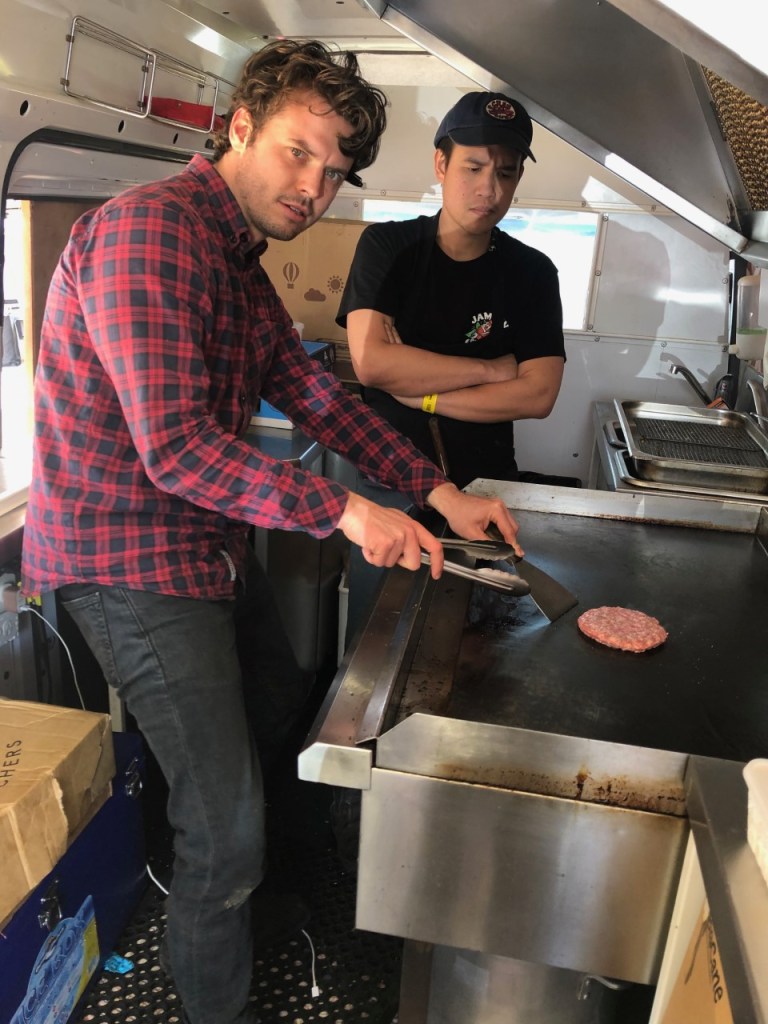The “How’d you get that job?” series examines career pathways. Hugo Koehne worked in various industries before he ended up as a production assistant and producer. He talks to Denise Eriksen.
Hugo Koehne had tried out a few careers before he arrived on the set of AppleTV+’s Shantaram, searching for items that had previously been blown up.
His first career? Ballet. He was accepted into the Australian Ballet School and was dancing his way into his future. Then, four years later, a devastating back injury put paid to that idea and he was forced to start again.
He decided to try acting – “a natural progression from ballet” – and did a Bachelor of Fine Arts for three years in Queensland.
He had a side hustle in hospitality, initially to support himself through university and then as he auditioned for acting work.
As the acting dream took a back seat, he was thinking that hospitality might be the industry for him.
“I was the day manager at a pub in Melbourne for 12 months and I was working in the industry as a potential career. I was at a crossroads of not really knowing yet what I wanted to do with my life.
“I loved working in the service industry because you are people facing, not behind a computer. The hospitality industry feels like the beating heart of a city and you’re a part of that! I think, though, that I always had harboured ambitions to be in film and TV in some capacity.”

So he decided, yet again, to start a new career behind the camera. “I emailed every line producer under the sun and offered myself for really any type of work.”
The search proved fruitful: His landed his first gig on Shantaram in Melbourne.
“It was the most curious job. I was tasked with locating and logging all the assets that were bought by the production. You might ask why that is necessary or think it might seem like a slightly absurd, made-up role but shows that have large budgets to buy props, set pieces, costumes and vehicles in volume – well, stuff goes missing! So, I guess it was a in fact totally necessary,” Koehne says.
“The list comprised of thousands of items ranging from a chaise lounge used on a set to an old car, to a bus, to a shipping container, to things I couldn’t even find because once I’d exhausted my search, I’d later find out that they were used to be exploded in a scene that shot months ago.”
Shantaram was a massive production and daunting for a first timer.
“There are so many departments, it’s really a massive machine and to learn all the intricacies of it, having never walked onto a set, let alone been in the film industry, is well, totally overwhelming. There’s no real mud map.”
His strategy to cope was to ask questions. Lots of them.
“It’s about asking them of the right people; the people at your level, the people that would be open and happy to help. I think you have to find your ‘allies’, people that can take you under their wing and that can be understanding of the level that you are at and be generous with their knowledge.”
From Shantaram, Koehne worked his way up the production ladder to production assistant – while also setting up his own production company to make his own films. This time, he’s confident he has found his place in the work world.
Hugo says the screen industries have a “longer runway” than hospitality, offering varied careers beyond managing or ultimately owning hospitality businesses. But he says the skills he learned were invaluable to take him to what he knows is his final career space.
“Hospitality makes you tough; you work long hours and that work ethic is so valuable for working in physical production, which runs at a pretty similar pace.”
“Being in hospitality management roles, your ability to triage problems and tasks in a really measured and logical way is another super valuable thing that I’ve brought across from hospo that I otherwise wouldn’t have learned.
“I’m so invested in this industry, I love it, invested in all those wonderful moments of magic that we’re creating. And I know that can sound a bit cliche, but when you’re on a set, you can really feel it; you can feel that magic, it’s palpable. There are stressful moments, but ultimately what we’re doing is creating imagination on screen. And that makes all those stressful moments worth it.”
Denise Eriksen is co-founder (with Esther Coleman Hawkins) of Media Mentors Australia.
The company has partnered with VicScreen to establish Set Educated, a new skills development initiative to prepare up to 400 Victorians to enter the screen industry in the coming months. It offers an introduction to the screen industry and showcases the crewing jobs available and how to get them. The first Set Educated session will be held at ACMI Melbourne on May 20 and a second in Geelong on May 21. Registrations are $25. More info here.
Update – Set Educated Events in Sydney: Saturday February 24, 2024 at ACE in Western Sydney and Saturday March 2, at NIDA in Central Sydney. An online event is planned for Saturday March 9.


